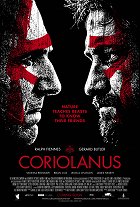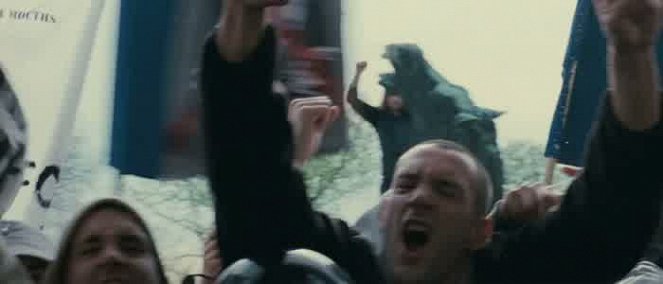Regie:
Ralph FiennesKamera:
Barry AckroydMusik:
Ilan EshkeriBesetzung:
Gerard Butler, Ralph Fiennes, Jessica Chastain, Brian Cox, Vanessa Redgrave, Lubna Azabal, Slavko Stimac, Radoslav Milenkovic, John Kani, James Nesbitt (mehr)Inhalte(1)
Coriolanus wurde in Rom als Held gefeiert, doch nun wurde er wegen seiner Überheblichkeit von den Bewohnern – sogar von seiner Mutter! – in die Verbannung geschickt. Er verbündet sich mit Tullus Aufidius, einem erbitterten Feind der Stadt Rom, mit dem zusammen er sich nun auf den Weg Richtung Rom macht, um die Stadt zu zerstören. (Verleiher-Text)
(mehr)Kritiken (6)
Ein hysterisch übertreibender Ralph Fiennes in einem seltsamen und schlecht verdaulichen Film, der Shakespeare-Dialoge mit dem Schießen aus Maschinenpistolen und eine politische Rebellion mit blutiger Gewalt verbindet. Langeweile und Verlegenheit, eine gute Szene mit der hervorragenden Vanessa Redgrave.
()
I thought I can make it through this Shakespearean play remade into the present. I hoped that the action scenes would be so interesting and brutal that they would keep me in suspense until the end. But in the end, I found out that this film is very difficult to process, and at the same time I had a hard time trying to keep my brain from jumping out of my head, because all the action scenes were shot in such a way that you don’t get to see a single explosion. I appreciate the attempt to shoot something differently. I still didn’t find the meaning of this film, but it was an attempt. And that counts.
()
One of the oldest stories, about betrayal, power and inscrutability of human nature set in more or less contemporary Serbia. Shakespeare’s verses cut deep, although in places the modern setting seems really weird. Very good acting performances, apart from occasional overacting from Fiennes. Butler is excellent, the same as the mother, Vanessa Redgrave. The action is superb, good and bloody. All the same, I’m sure this picture won’t suit the tastes of many viewers. Traitor?! The fires in the lowest hell fold in the people!
()
Transpose of old materials into the present will always be an exciting topic in the field of adaptations. But personally, I doubt the universality of Shakespeare for a story from modern warfare. Shakespeare wrote Coriolanus at the beginning of the 17th century, based on events set in the 5th century BC. The story of the Roman general Gnaeus Marcius Coriolanus appealed to not only Shakespeare but also Brecht and many other playwrights, and therefore I would rather see a reverse adaptation set in the ancient world, because although some emotions are understandable, the individual actions of the characters, their motivations, and the nature of conflicts simply do not correspond to today's understanding of the world.
()
Ich hatte einige Bedenken, aber alle waren unnötig. Shakespeares Tragödie ist zeitlos und immer noch aktuell. Das weiß ich, weil "Coriolanus" eines meiner Lieblingsstücke ist. Aber die Übertragung in die Gegenwart? Sie ist unerwartet gelungen! Die Theaterbühne wurde durch Fernsehnachrichten ersetzt, die Schwerter durch Maschinenpistolen. Die Verse sind geblieben. Die Schauspielleistung von Ralph Fiennes ist absolut hinreißend. Für seine Arbeit hinter der Kamera muss er sich aber auch nicht schämen (das Finale!). Vanessa Redgrave, Brian Cox und Jessica Chastain sind absolut toll und Gerard Butler hat mich mit seiner natürlichen Leistung sehr überrascht. Ich gebe zu, dass der Film wahrscheinlich nicht jedermanns Sache ist, aber zumindest Shakespeare-Fans sollten ihm eine Chance geben.
()
"Coriolanus" is a film that simply must appeal to critics. Originally, it is one of the lesser-known plays by the renowned William Shakespeare. Furthermore, Ralph Fiennes took on the task of making it for the screen. Although it is his directorial debut, at first glance, I thought that this excellent actor would know what he was doing. Personally, I think he is one of those who are perfectly suited for Shakespearean dramas. He has something theatrical within him that can evoke strong emotions, and he tried to transfer that onto the screen. His Roman general, Coriolanus, is very theatrical, very overacted. The question arises: was Fiennes really so visionary or did he have such a clear idea of his film that his overacting was completely intentional, or is it simply a mistake? I want to believe the first option, because when I say that it is a Roman general, of course, I am talking about ancient Rome, not present-day Rome. However, the story is transferred to the present day. Modern technology is used - the use of television is truly great - the concept of Rome is wonderfully transferred to contemporary politicians, as is the contrast with modern uniforms and rhymed verses of a theatrical magician. But then the question arises: if Fiennes wanted to present the film as a theatrical play with modern sets and costumes, why is he the most theatrical one while the others remain in a film mood? It's a shame. If it had been more theatrical, I think the film could have had a greater impact. Or on the contrary, focus on the film form. The material is definitely worth it, but the execution is uncertain. More: http://www.filmovy-denik.cz/2012/08/parmeni-krysy-z-temnot-mi-4-blazniva.html
()

